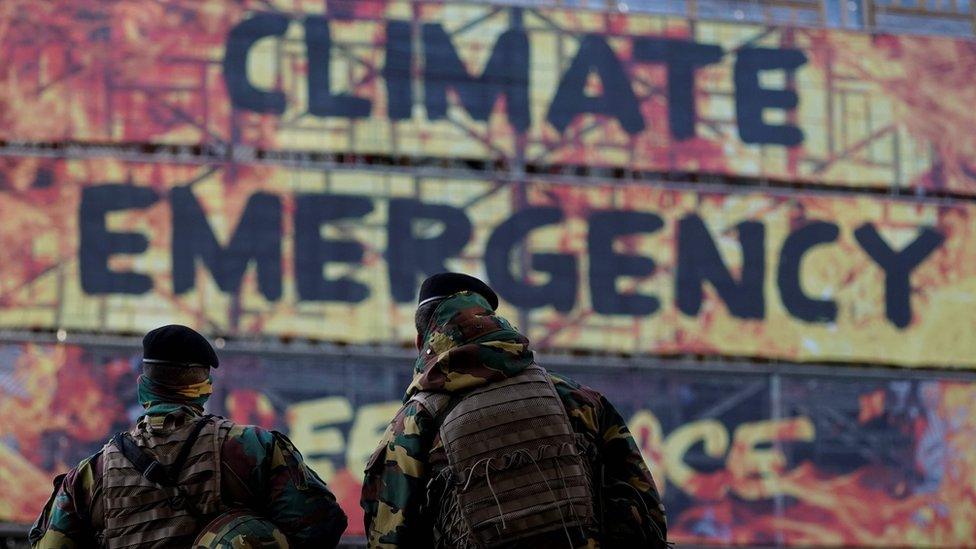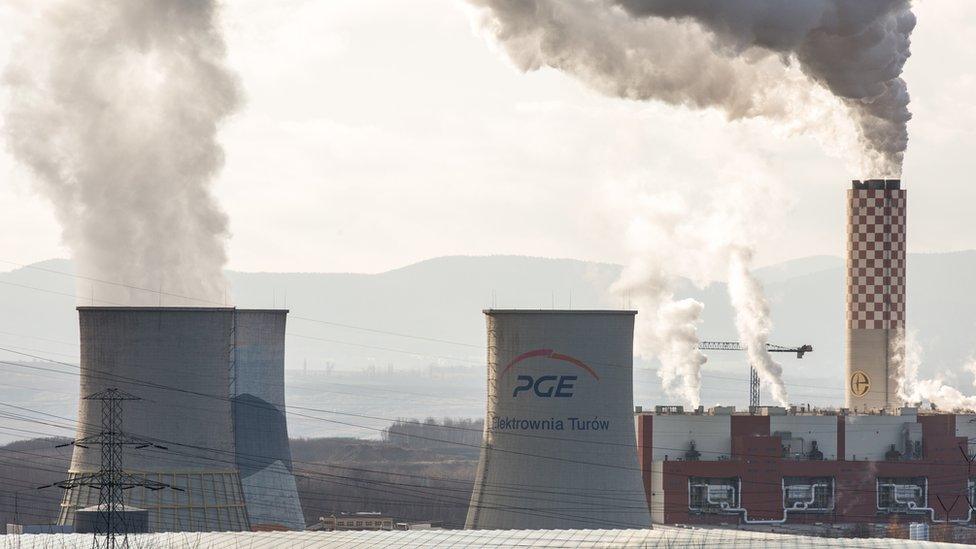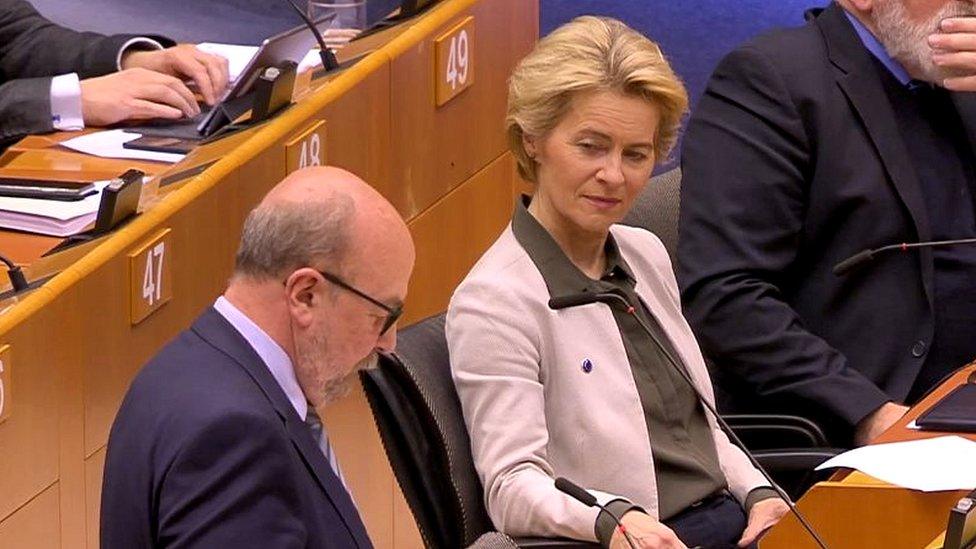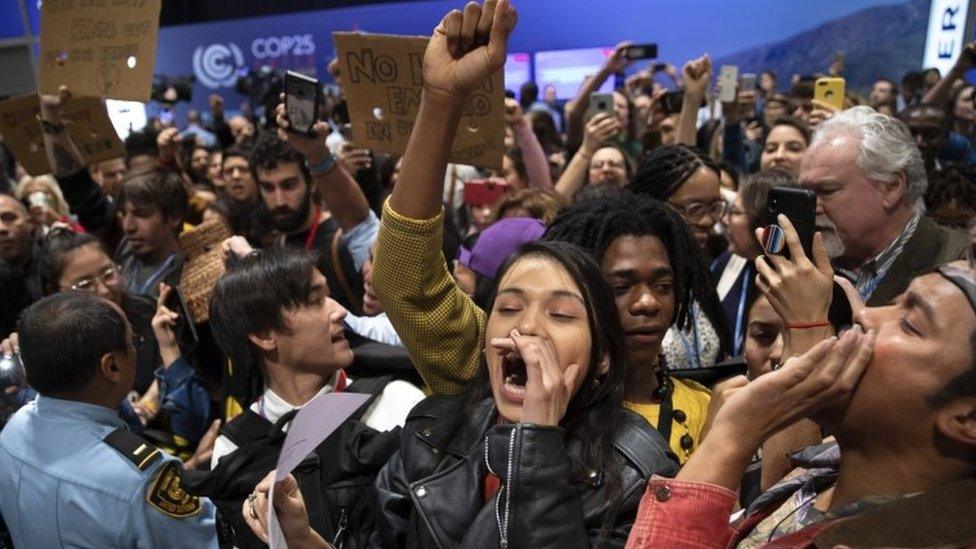EU leaders haggle over climate neutrality pledge
- Published

Security forces were called in when Greenpeace protesters scaled the summit building and unfurled a banner
European Union leaders are holding talks in Brussels amid pressure to commit to making the 28-member bloc climate neutral by 2050.
Several Eastern European countries want financial and other guarantees before they agree to the EU cutting to zero its net amount of greenhouse emissions.
But Ursula von der Leyen, the new head of the EU's executive, has placed the aim at the heart of a new "Green Deal".
Billions of euros would be added to the EU budget to move from fossil fuels.
The "Just Transition Mechanism" would include funding from the European Investment Bank and would support states such as Poland, the Czech Republic and Hungary, which are among the EU member states most reliant on coal.
Arriving for the summit, Czech Prime Minister Andrej Babis said he would seek assurances that Prague could continue to pursue nuclear power. Hungary's Viktor Orban was adamant that "poor people and poor countries" should not bear the financial cost of fighting climate change.
President Emmanuel Macron of France, which relies on nuclear power for almost three-quarters of its electricity needs, said it was obvious that nuclear power would have to stay, as long as the right mechanism was found. Austria's chancellor agreed.
Ahead of the summit, Greenpeace activists used an old fire engine to climb the European Council building, before unfurling a banner reading "climate emergency" and setting off flares. The protesters complained the EU was doing too little, too late.

Poland is among the EU nations that is seeking billions in EU funds to help move away from fossil fuels
The new president of the European Council, Charles Michel, said ahead of the summit that he wanted EU leaders to pledge that the bloc would become climate neutral by 2050.
Climate neutrality, he said, would be "a strong signal for the future of Europe" showing the need to "massively" invest in innovation as officials and experts meet in Madrid for the UN climate summit.
Finland's PM said she hoped leaders would agree a common goal
Finland's new Prime Minister Sanna Marin said new generations expected the EU to act - and it had to act faster.
What is the plan?
The European Green Deal, external was described by European Commission President Ursula von der Leyen as Europe's "man on the Moon" moment. It includes:
A €100bn (£84bn; $110bn) Just Transition Mechanism to help countries still heavily dependent on fossil fuels and "carbon-intensive processes" to move to renewable energy sources
Proposals to reduce greenhouse gas emissions to 50% of 1990 levels or even lower by 2030 - instead of the current target of 40%
A law that would set the EU "on to an irreversible path to climate neutrality" by 2050
A plan to promote a more circular economy - a system designed to eliminate waste - that would address more sustainable products as well as a "farm to fork" strategy to improve the sustainability of food production and distribution
Although the new Commission's proposals are ambitious, they have to be signed off by EU leaders if they are to get anywhere.
An official said on the eve of the summit that there might or might not be a deal in Brussels. The test was whether EU leaders were prepared to make a commitment before negotiations on the 2021-27 EU budget came to an end.
What is climate neutrality?
Climate neutrality involves balancing emissions by removing warming gases from the atmosphere.
Warming emissions created by cars and power plants are counteracted by removing greenhouse gases from the air by planting new forests or through carbon capture technologies that bury CO2 underground.
What are the objections to the deal?
One of the big problems EU leaders will have is finding the money from a budget that is already set to shrink if the UK leaves the bloc next year. There was no UK prime minister at Thursday's summit because of the general election.

Polish MEP Ryszard Legutko pours cold water on the ideas of the new head of the European Commission
Polish officials have already welcomed the planned mechanism for compensating countries whose economies are still reliant on the coal industry. Coal currently produces 80% of Poland's power.
However, they say the cost of transition for Poland in particular will be huge, and it is not just one budget that would need to carry the cost but budgets all the way through to 2050.
A sign of the scepticism came from Ryszard Legutko, an MEP from Poland's ruling Law and Justice party, who told the European Parliament on Wednesday that the strategy was confused and prompted more questions than it answered.
"Have you any idea of the social cost as well as the personal tragedies it will generate?" he asked the Commission president.
It is not just Poland, Hungary and the Czech Republic that have reservations.
Romanian MEP Dan Nica warned that if his country was to meet its 2030 target, it would cost 40% of its economic output, with a price of almost €8bn a year. Families living near mining areas would be particularly affected, he said.
- Published12 December 2019
